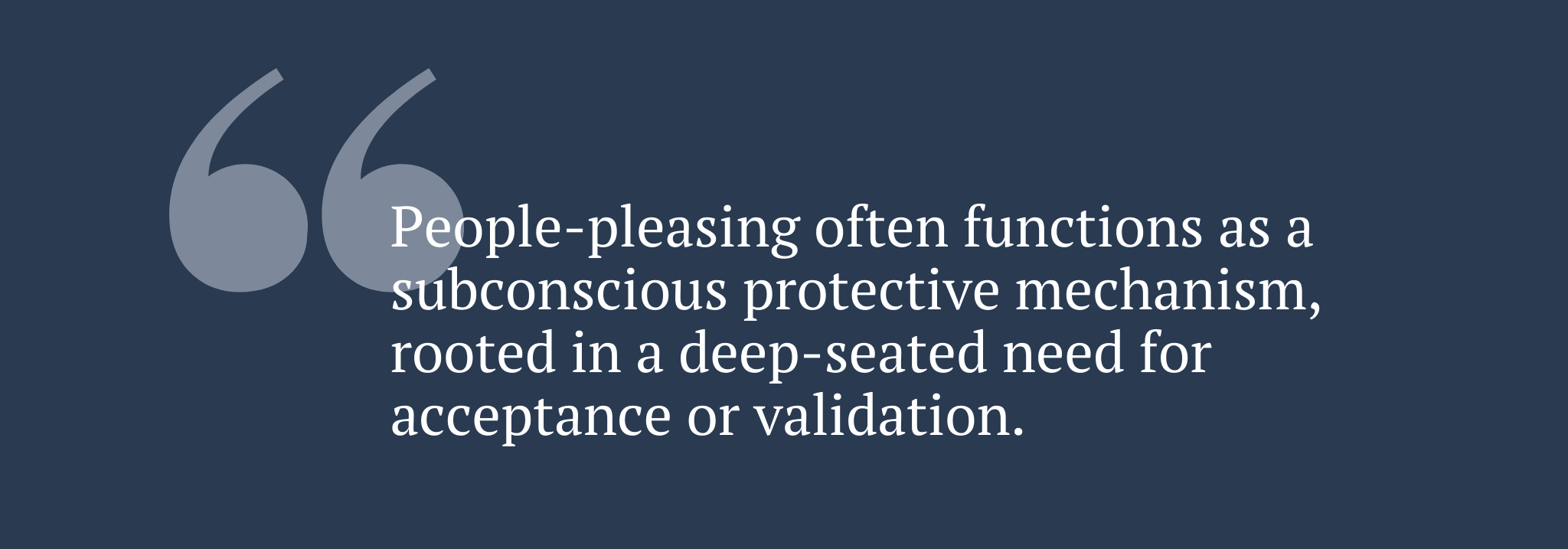Prioritising their needs over yours might seem like the easiest thing to do – but putting yourself first can change everything
Whether it’s taking on extra tasks at work, stretching yourself thin to commit to family plans, or avoiding conflict with a partner, pleasing-people takes many guises. Recognised as a type of behaviour where you prioritise the needs of others at the expense of your own, nearly half of US adults self-identified as people-pleasers in a 2024 YouGov poll – with women (52%) more likely than men (44%) to see this behaviour in themselves.
“While helping others can be fulfilling, constantly doing so without considering your own wellbeing can lead to feelings of exhaustion, diminished self-worth, and even resentment towards yourself or others,” psychotherapist, Dr Hayley Trower, explains. If this resonates with you, there are practical steps you can take to reduce these tendencies.
Understand why
First, look at why this pattern is playing out. “People-pleasing often functions as a subconscious protective mechanism, rooted in a deep-seated need for acceptance or validation,” Dr Trower explains. Often this can be traced back to ur early years, when approval may have depended on being compliant. “By understanding the motivation behind your people-pleasing, you will be better able to take a pause and try something different that supports your needs,” Dr Trower adds.
Reflect on a recent situation where you felt compelled to please others. Intentionally think this over, or perhaps, try journaling with Dr Trower’s guidance: “Ask yourself three questions: what was your underlying intention? What did you believe might happen if you didn’t? Were there any self-beliefs influencing your behaviour at that moment?”

Practise self-compassion
Self-worth issues are at the heart of people-pleasing. “Those who people-please feel their value depends on how other people perceive them,” Dr Trower says.
To develop healthy self-worth, it’s important to alter your focus from looking outwards to looking inwards. Once you notice these self-critical thoughts, shift towards something kinder. Dr Trower suggests instead of thinking, ‘I shouldn’t have made that mistake,’ say, ‘I made a mistake, but I’m human and I’m doing my best.’ “It might feel uncomfortable at first, but, over time, a compassionate inner dialogue can make a difference to the way that you feel about yourself.”
Regulate your nervous system
When we do things we find uncomfortable, it can often trigger feelings of guilt, fear, or anxiety. If we have spent our whole lives in people-pleasing mode, a new way of being can, naturally, feel uncomfortable at first. We deal best with these feelings when our nervous system is regulated, so investing in managing this is crucial during this transitional period. Grounding techniques, such as deep breathing, mindfulness, or progressive muscle relaxation, can be hugely beneficial. Dr Trower recommends extended exhales (in for four counts, hold for four, out for six). “This sends a message to your nervous system that you’re safe, and can help you to feel more in control,” she explains. “By learning to self-regulate, you can approach new situations with greater calm and confidence, even when they feel challenging.”

Set boundaries
When you’re in a people-pleasing mindset, it’s normal to shy away from boundaries. Plus, setting boundaries can be daunting, especially if you’re not used to saying ‘no’. Dr Trower suggests rehearsing how you’ll respond in specific situations so you feel more prepared – and less reactive – when the occasion arises. “Try practising some clear statements in front of the mirror, without needing to over-explain,” she says. She proposes phrases like ‘I’d love to help, but I’m really overwhelmed with work at the moment,’ or ‘Thank you so much for thinking of me, but I’ll have to pass this time. Perhaps we could do it another time?’ “Rehearsing these phrases out loud, or with someone you trust, can help them feel more natural,” says Dr Trower. “The more often you set boundaries, the less uncomfortable they will feel.”
Embrace discomfort
When you cut back on people-pleasing, you will likely have to accept that you’ll start disappointing people more often, something that may not feel easy at first. “It’s important to know that discomfort doesn’t always mean that you’ve done something wrong,” says Dr Trower. “Often it’s a sign of healthy growth. By sitting with these feelings rather than avoiding them, you can begin to build resilience.”


Comments